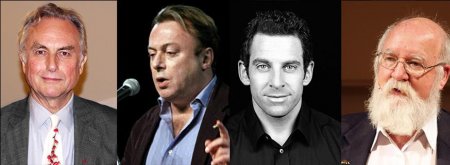Understanding the New Atheism
There's a new kind of atheism these days, the proponents of which stand in adamant opposition to religion. Dr. Douglas Groothuis gives us a rundown of this 'new atheism'. In Part 1 of this series, he shows us two key errors these new atheists make.
A New Breed of Atheism
"There is no God, and I hate him!" This seems to be the subtext for much of the 'new atheism' propounded in books by Richard Dawkins, Sam Harris, Christopher Hitchens and others. What distinguishes this new breed of unbelief is, in part, its vehemence and vitriol. The gloves are off. Religion – all religion – is not just false, but dangerous to civilization itself. Dawkins concludes his book, The God Delusion, by arguing that raising children to be religious is a form of child abuse. Hitchens concurs. God, given His bad reputation, must be banished from the universe.
Behind much of the atheism of today is a false view of God and religion. It's a straw man fallacy, which occurs when someone presents a weak or inaccurate view of a position and then cuts it down. Atheists are often guilty of this fallacy with respect to God. This may be called the 'straw god' fallacy: a false idea of God is easily refuted. While responding to all the fallacious arguments of the new atheists would take a book in itself, we can, nevertheless, highlight two of their basic errors.
Error #1: All Religion is Similarly Irrational
First, the new atheists view all religion as equally anti-intellectual and evidentially-challenged. Thus, a few deft blows to the sacred head can disarm and destroy all religion as irrational. Sam Harris is a particularly egregious offender in this matter. But religions differ markedly concerning their basic worldviews as well as their means of intellectually defending themselves. For example, Mormonism is based on indemonstrable historical claims and relies heavily on subjective experience to verify itself.[1]
the new atheists view all religion as equally anti-intellectual and evidentially-challenged.
Historic Christianity, on the contrary, is well rooted in objective historical facts. The New Testament was written a short time after the events it describes and by eyewitnesses or those who consulted eyewitnesses (Luke 1:1-4; John 21:24). Crucial events described in the New Testament are corroborated by extra-biblical historians and by archaeology.[2] The original manuscripts of the New Testament have been reliably transmitted over time.[3] Further, while spiritual experiences are central to Christianity,[4] it does not hang its entire credibility on them, since the evidence from history and nature is strong.
Therefore, Christopher Hitchens' arguments against Mormonism in his book God is Not Great may succeed without having any implications for Christianity.[5] Similarly, an atheist may argue against Buddhism and Hinduism by rightly claiming that they are mystical religions that are unanchored from history and deny the significance and worth of the material world. But these criticisms have no force against Christianity, given its stubborn historicity and its affirmation of the universe as created good by God and redeemed by God Himself through the Incarnation (John 1:1,14).
Error #2: No Arguments for God Succeed
The new atheists believe that the idea of God as Creator and Designer is irrational, a mere leap of blind faith. Atheists are (rightly) angry at this notion of a God who requires intellectual suicide for belief and worship. Yet their indignation fails to disprove God's existence. Dawkins, Harris and Hitchens decline to take seriously the strongest arguments for God. Instead, they present weak arguments and then tear them down. Yet there are powerful arguments for God's existence, which gain in power the more science reveals about the universe.
Evidence for Big Bang cosmology has accumulated over several decades, making it the most established scientific account of the origin of the cosmos. According to this account, everything came into being out of nothing in the far distant past.[6] This conclusion takes away atheism's old security blanket: there is no need for God, since the universe has always existed.
But if the universe came into existence at some point, we are left with only two options.
(1) It came into existence without a cause or
(2) It came into existence with a cause.
The new atheists believe that the idea of God as Creator and Designer is irrational, a mere leap of blind faith
Option (1) is either impossible or profoundly unlikely, given our sense of cause and effect. We assume that material events have causes that explain their existence. To deny that the universe had a cause means that it popped into existence. This is what philosopher Dallas Willard calls "big bang mysticism". It is far more rational to believe that whatever begins to exist has a cause of its existence. If this is so, then it must be inferred that something outside the universe was the cause of the universe. The best candidate is a personal agent of unlimited power.[7] "In the beginning, God created the heavens and the earth" (Genesis 1:1, NIV).
Evidence is also mounting that the universe is designed to be inhabited by humans. This is evidenced through the complex and intricate fine tuning of various aspects of the world. Many constants in the universe have infinitesimal margins of error. If any of them were only slightly off, there could be no humans. Physicist Martin Rees notes that:
1. Our universe could not have become structured if it were not expanding at a particular rate.
2. If the big bang had produced few density fluctuations, the universe would have remained dark, with no galaxies or stars.
3. If our universe had more than three spatial dimensions, planets could not stay in orbits around stars.
4. If gravity were much stronger, it would crush living organisms of human size, and stars would be small and short-lived.
5. If the nuclear force were a few percent weaker, only hydrogen would be stable: there would be no periodic table, no chemistry.
But Rees claims that this does not indicate that a Designer fine-tuned the universe for life. It is all sheer, dumb luck. "Some would argue that this finetuning of the universe, which seems so providential, is nothing to be surprised about, since we could not exist otherwise."[8] Rees dismisses these fine-tuned aspects of the universe – and there are many others – as accidental, not designed. But in doing so, he confuses two very different things:
(1) the factors that must be the case for us to exist and to observe the universe and
(2) the explanation for the highly improbable configurations that allow us to exist to observe the universe.
This highly improbable arrangement surely cries out for an explanation, not a truism. If all these factors are in place, then we will exist and observe them, but this does not account for why these factors came into being in the first place.
Faced with the fine-tuning problem, atheists may also appeal to the 'many universe theory', which claims that our universe is not really unlikely because it is merely one of countless other universes that lack the sophisticated fine-tuning required for life. Ours is simply the lucky universe. But this theory is a desperate 'hail Mary' pass at the end of a game that the atheists are losing badly. There is no evidence for other universes; they are merely postulated to banish God from this one. This is purely ad hoc.[9]
New, but Not True
More could be said about the new atheists' straw god arguments. Their claim that all religions are irrational is false because it disregards the significant differences between religions – differences that make a difference. Moreover, their assertion that one must be irrational to believe in God is false. The existence of a God can be inferred rationally on the basis of solid and sufficient scientific evidence. Additionally, the historical evidence for Christianity is very strong – although I discussed it only briefly.
The atheism of Dawkins, Harris and Hitchens may be new, but it is not true. Their straw god is not the real God who created and designed the universe.
Notes
[1] See Walter Martin, The Kingdom of the Cults, revised edition, Hank Hanegraaff, general editor (Minneapolis, MN: Bethany House, 1997), chapter six.
[2] See Craig Blomberg, The Historical Reliability of the Gospels, 20th anniversary edition (Downers Grove, IL: InterVarsity Press, 2007).
[3] See Timothy Paul Jones, Misquoting Truth: A Guide to the Fallacies of Bart Ehrman's 'Misquoting Jesus' (Downers Grove, IL: InterVarsity Press, 2007).
[4] For the argument for God from religious experience, see J.P. Moreland, Scaling the Secular City (Grand Rapids, MI: Baker Books, 1987), pp.231-240.
[5] Christopher Hitchens, God is Not Great (New York: Twelve Books, 2007), pp.161-168.
[6] See William Lane Craig and Paul Copan, Creation Out of Nothing (Grand Rapids, MI: Baker Books, 2004), chapter seven.
[7] See Douglas Groothuis, 'Metaphysical Implications of Cosmological Arguments', in James Sennett and Douglas Groothuis, eds. In Defense of Natural Theology (Downers Grove, IL: InterVarsity Press, 2005).
[8] Martin Rees, 'Exploring Our Universe and Others', Scientific American Special Issue: The Once and Future Cosmos (2002), p.87.
[9] See J.P. Moreland and William Lane Craig, Philosophical Foundations of a Christian Worldview (Downers Grove, IL: InterVarsity Press, 2004), pp.482-490.
© 2005 Douglas Groothuis
All rights reserved. International copyright secured.



